Pareto Power: ABC Segmentation For High-Value Control

In the complex world of inventory management, treating all items equally represents one of the most costly mistakes organizations make. The reality is that a small percentage of inventory items typically account for the vast majority of value, revenue impact, and operational importance. ABC inventory analysis harnesses this fundamental truth through the Pareto principle, the 80/20 rule that reveals how roughly 20% of inventory items drive 80% of consumption value.
View More

Spot, Clear, Cash In: The Excess Inventory Aging Analyzer

The strategic importance of excess inventory management extends far beyond simple cost reduction. Effective aging analysis drives liquidity improvements that fund innovation and market expansion. It optimizes space utilization, allowing warehouses to accommodate higher-velocity products that drive revenue growth.
View MoreCatch Sales Spikes Before They Kill Revenue: The Dashboard That Ends Stockouts
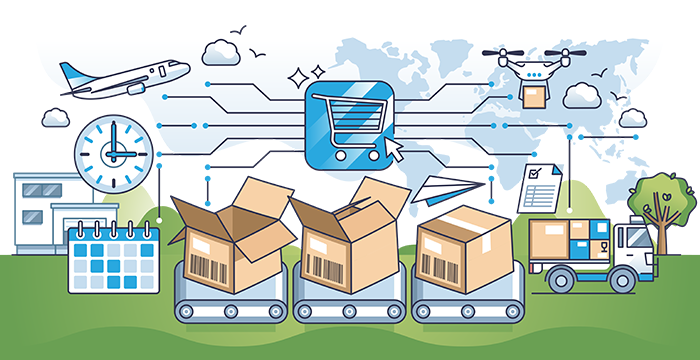
Traditional approaches to inventory management have left organizations vulnerable to these revenue-destroying events. Static reorder points, manual spreadsheet tracking, and reactive planning methods simply cannot keep pace with the dynamic nature of consumer demand. When a product goes viral on social media, when seasonal trends shift unexpectedly, or when promotional campaigns exceed expectations, conventional systems fail to signal the impending crisis until it's too late.
View More

From Chaos To AI Precision: AI-Driven Workforce Planning and Scheduling Automation in Logistics

ai-in-workforce-planning-and-scheduling-automation-in-logistics-in-scm-2026 Blog Landing Page Content: The logistics industry is facing an unprecedented labor crunch that threatens operational continuity and customer satisfaction. Rising demand variability, unexpected absenteeism, persistent skill shortages, and mounting operational pressures have created a perfect storm for supply chain professionals. Artificial intelligence offers a transformative solution to these workforce planning challenges through predictive analytics and intelligent automation.
View MoreDesign Before You Decide: AI-Powered Supply Chain Network Design & Scenario Planning
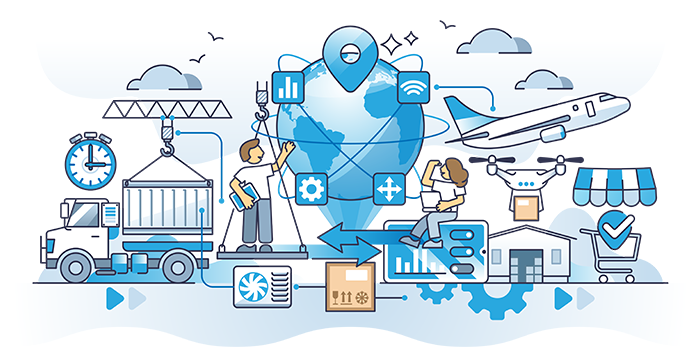
The traditional approach to supply chain network design is becoming obsolete. For decades, organizations relied on comprehensive network studies conducted every three to five years, treating their supply chain infrastructure as relatively static. These periodic reviews would assess facility locations, transportation routes, and inventory policies, then lock in decisions for the next several years. But in today's volatile business environment, this approach leaves companies dangerously exposed.
View More
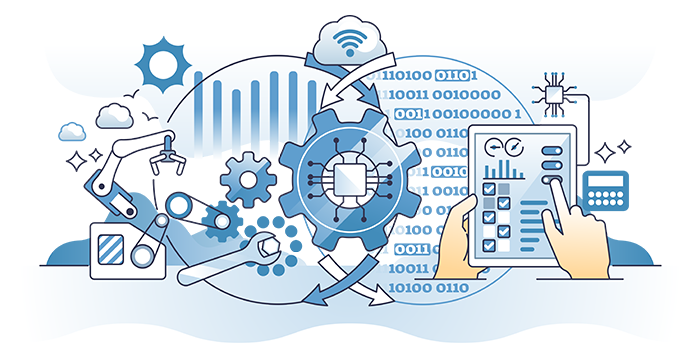
Edge Use Cases: Inventory, Quality, and Beyond

The strategic promise of edge computing for supply chains centers on three fundamental advantages. First, it enables faster and more reliable decisions at the precise point where activities occur, whether that is a robotic picking station, a production line sensor, or a delivery vehicle. Second, it dramatically reduces the connectivity and cloud dependency costs that burden operations relying exclusively on centralized processing. Third, it enhances overall resilience, safety, and responsiveness across increasingly complex supply chain networks.
View MoreKeeping Cool With AI: Smarter Cold Chain Monitoring From End-To-End

Modern logistics operations face a dual challenge that demands immediate attention, mounting waste streams from packaging materials, damaged goods, and facility operations, coupled with the carbon-intensive nature of powering warehouses, distribution centers, and transportation networks. These challenges are not isolated problems but interconnected issues that directly impact operational costs, environmental footprints, and competitive positioning in an increasingly sustainability-conscious marketplace.
View More

Predict Before You Produce: AI-Powered Demand-Supply Balancing For Modern Supply Chains

Modern supply chains face a fundamental challenge on how to predict what customers will want, when they will want it, and whether the organization can deliver it profitably. Predictive analytics in supply chain management offers a powerful answer to this challenge. At its core, predictive analytics represents a data-driven and model-driven approach to anticipating future demand, supply conditions, and operational constraints before they unfold.
View MoreCircular Energy: Transforming Supply Chain Waste into Facility Power
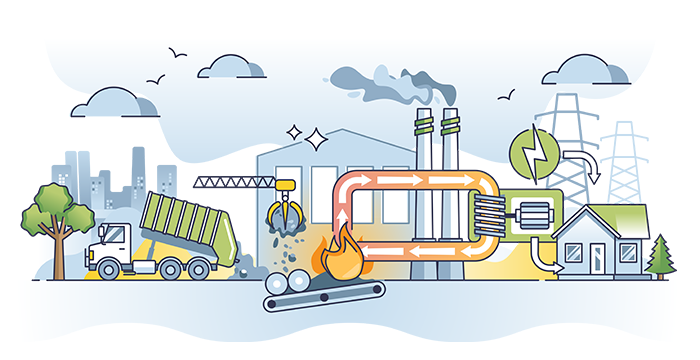
Modern logistics operations face a dual challenge that demands immediate attention, mounting waste streams from packaging materials, damaged goods, and facility operations, coupled with the carbon-intensive nature of powering warehouses, distribution centers, and transportation networks. These challenges are not isolated problems but interconnected issues that directly impact operational costs, environmental footprints, and competitive positioning in an increasingly sustainability-conscious marketplace.
View More
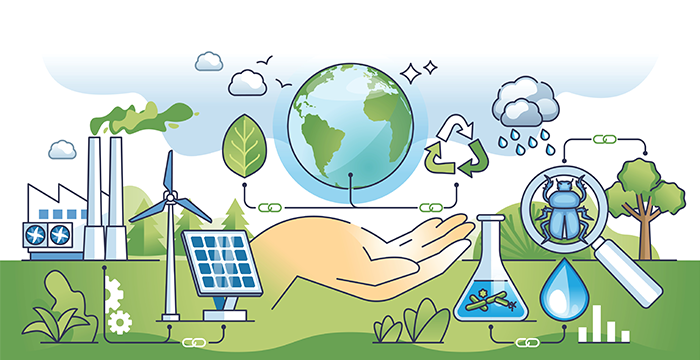
Powering Logistics: The Renewable Energy Revolution in Warehousing and Transportation

Renewable energy in logistics offers a compelling path forward. Solar, wind, and hydrogen technologies deliver not only environmental benefits but also significant economic advantages through reduced energy costs, enhanced operational resilience, and improved brand reputation. Companies embracing these solutions position themselves as industry leaders while building competitive advantages that extend far beyond compliance.
View MoreSmarter Sourcing: How AI Is Revolutionizing Procurement and Contract Management
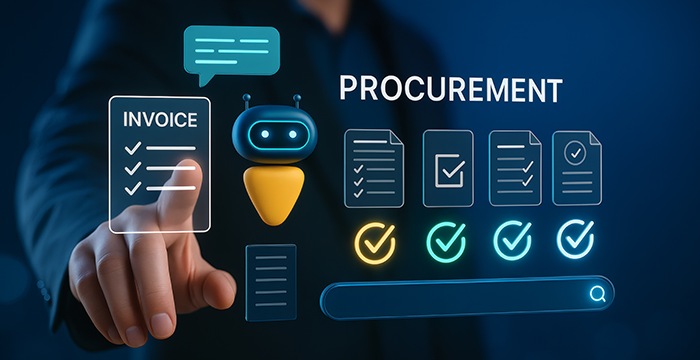
For decades, procurement teams have wrestled with fragmented systems, manual data entry, and decision-making based on incomplete information. The transition to intelligent sourcing and digital procurement transformation changes this paradigm entirely. Organizations now move from disconnected, paper-heavy operations to cohesive, data-driven procurement ecosystems where machines handle routine tasks and provide analytical insights that would be impossible to generate manually. Content: Blog content is attached as a text file to this email
View More
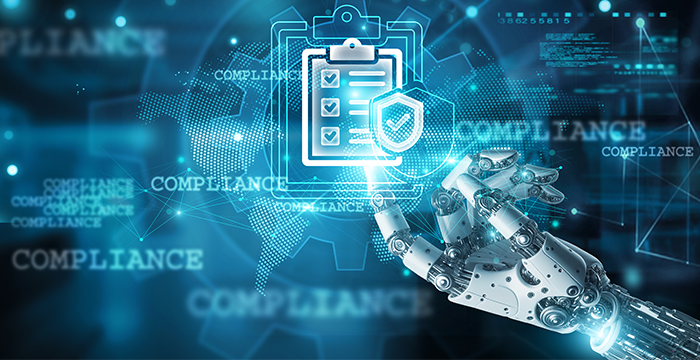
Smart Supplier Surveillance: AI-Powered Risk and Compliance Monitoring

AI-powered supplier risk monitoring represents a fundamental shift from episodic assessments to continuous, automated evaluation leveraging advanced analytics and real-time intelligence. This transformation enables procurement and risk management teams to detect emerging threats before they materialize into crises, automate compliance verification across diverse regulatory frameworks, and make data-driven decisions about supplier relationships.
View MoreBeyond Human Limitations: AI Powering the Future of Fleet Management
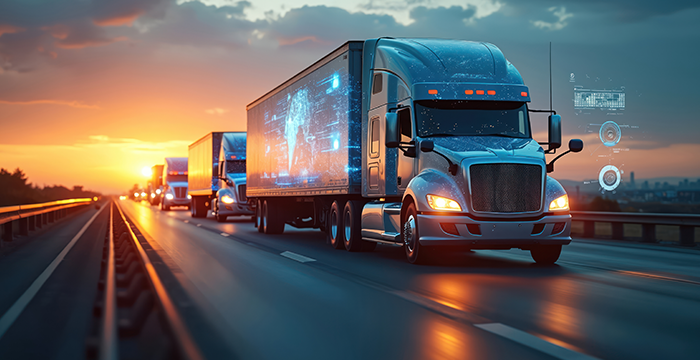
Logistics industry faces a severe and worsening driver shortage. Aging demographics, challenging working conditions, and lifestyle preferences among younger workers have created a structural deficit in qualified commercial drivers. This shortage drives up labor costs while simultaneously limiting capacity, forcing companies to turn away business or pay premium rates for contracted carriers. Autonomous fleet management offers a path through this constraint by reducing the number of drivers needed per delivery and enabling existing drivers to focus on higher-value activities that genuinely require human judgment and customer interaction.
View More

Edge AI: Powering Real-Time Visibility and Control in Modern Supply Chains

Edge AI represents the convergence of artificial intelligence and edge computing, creating systems that can perform sophisticated analysis and decision-making directly on devices located at the operational edge of networks. Unlike traditional AI architectures that concentrate computational resources in centralized cloud data centers, edge AI distributes intelligence across numerous local devices, each capable of running trained machine learning models to process sensor data, visual inputs, or other information streams in real time.
View MoreData to Decisions: Explainable AI (XAI) for Transparent Supply Chain Decision Making

Explainable AI in supply chain management represents a transformative approach that makes artificial intelligence systems understandable to human decision-makers. Unlike traditional black-box algorithms that produce recommendations without revealing their reasoning, XAI transparency ensures that every prediction, optimization, and decision pathway can be traced, understood, and validated by supply chain professionals.
View More

Integrating RPA, AI, and ML: A Hyperautomation Framework for Modern Supply Chains

Unlike conventional automation that focuses on individual processes, hyperautomation represents a comprehensive digital transformation in supply chain operations. This advanced approach integrates multiple cutting-edge technologies, including Robotic Process Automation (RPA), Artificial Intelligence (AI), Machine Learning (ML), Internet of Things (IoT), and advanced analytics to create seamless, end-to-end automated workflows. The result is a supply chain that not only operates faster and more efficiently but also adapts and learns from every interaction, continuously improving its performance.
View MoreSpeak Up: How Conversational AI is Transforming Supply Chains
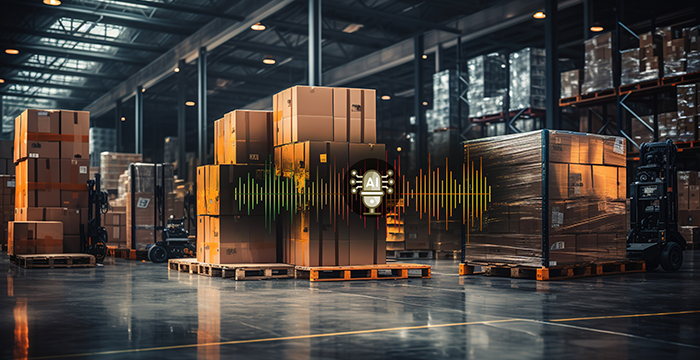
The supply chain industry stands at the threshold of a revolutionary transformation, driven by the rapid adoption of voice technology and conversational AI. This shift represents more than just a technological upgrade, It signals a fundamental reimagining of how logistics operations function, moving from traditional screen-based interfaces to intuitive, hands-free voice interactions that enhance both efficiency and worker satisfaction.
View More
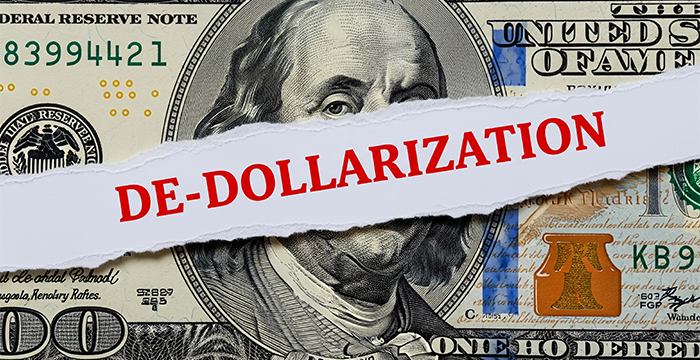
From Dollar Dominance to Diversification: What De-Dollarization Means for Supply Chains

The growing debate around de-dollarization has intensified as nations seek greater monetary sovereignty and reduced exposure to US economic policies. From China's push for yuan internationalization to the European Union's efforts to strengthen the euro's role in global trade, the movement toward currency diversification is gaining momentum. This shift carries profound implications for the supply chain market
View MoreFrom Overwhelm to Efficiency: Smarter Systems for Human-Centric Operations

In a business context, human-centric design means prioritizing the human experience in every aspect of operational planning and implementation. This approach involves understanding how employees actually work, think, and interact with their environment, then designing systems and processes that complement these natural patterns rather than fighting against them. Human-centered technology solutions focus on reducing cognitive burden, eliminating unnecessary complexity, and providing intuitive interfaces that feel natural and empowering to use.
View More
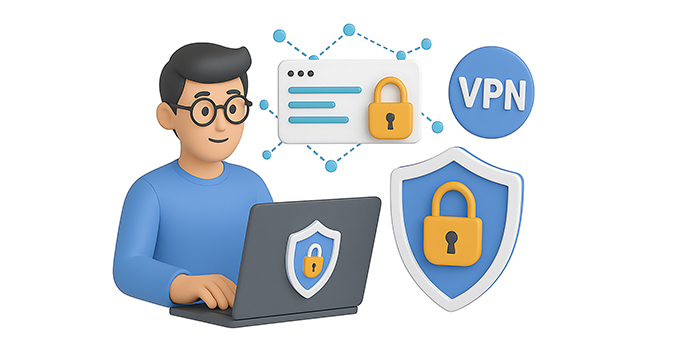
Zero-Trust Supply Chains: A New Standard for Cybersecurity

Traditional perimeter-based security models, which operated on the assumption that everything inside the network could be trusted, have proven inadequate against sophisticated supply chain attacks. The rise of zero-trust as a new standard represents a fundamental shift in how organizations approach supply chain security. Instead of assuming trust based on network location, zero-trust architecture operates on the principle of "never trust, always verify," treating every user, device, and system as potentially compromised until proven otherwise.
View MoreSwarm Robotics in Warehousing: Coordinated Fleets that Adapt on the Fly
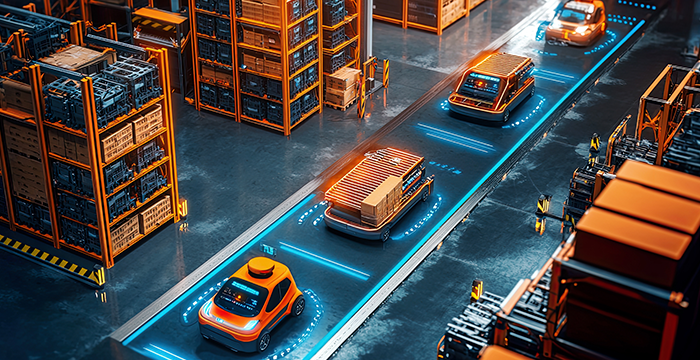
Swarm robotics in the warehousing context represents a sophisticated approach to automation where multiple autonomous warehouse robots operate as a unified system, sharing information and coordinating actions without centralized command structures. These warehouse robotics systems draw inspiration from natural phenomena such as ant colonies, bee swarms, and bird flocks, where individual agents follow simple rules that collectively produce complex, adaptive behaviors benefiting the entire group.
View More
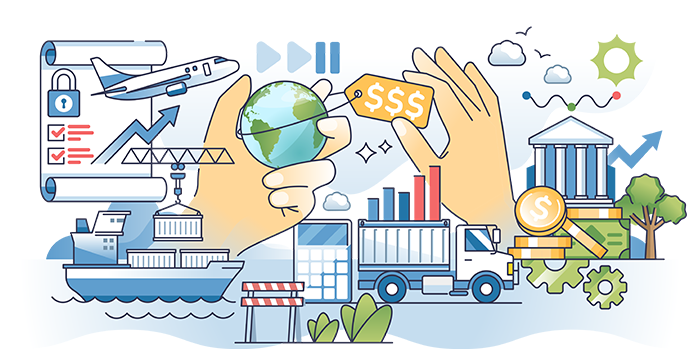
From Reactive to Proactive: Self-Healing Solutions for Modern Logistics

What if supply chains could repair themselves? Imagine a logistics network that detects disruptions instantly, evaluates alternatives automatically, and implements recovery strategies without human intervention. This transformative concept mirrors self-healing materials that automatically repair microscopic damage at the molecular level, but applies this principle to global commerce networks.
View MoreSmarter Stock, Leaner Chains: Real-Time, Quantum, and AI Tactics for Inventory Wins
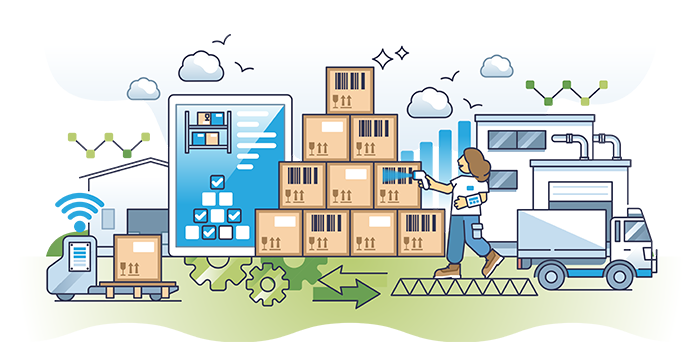
The need for a smarter, more adaptive approach to inventory optimization has never been more urgent. In today's global economy, demand shifts rapidly, supply chains span great distances, and digital transformation heightens competition across industries. This volatile environment has turned traditional inventory management into a high-stakes challenge, recent disruptions have significantly increased inventory costs, straining operations and resilience.
View More

From Scarcity to Sustainability: Innovative Approaches to Water and Resource Management

Water and resource stewardship involves the integration of water conservation, recycling, and sustainable resource use throughout every stage of supply chain management. Rather than relegating water management to mere regulatory compliance, leading organizations now recognize water as a strategic asset that smart stewardship supports operational resilience, reduces costs, and builds reputational advantage in an era of increasing environmental scrutiny.
View MoreThe Rise of Biodegradable and Reusable Packaging in Supply Chains

The rise of sustainable packaging marks a pivotal shift, as brands and supply chain leaders recognize their role not only in minimizing harm but in enabling circular supply chains. Sustainability has become a foundational principle, driven by consumer expectations for greener choices and by regulations targeting single-use plastics.
View More

Flag, Detect, Protect: Real-Time Solutions for Workforce Security

Real-time fraud detection is the practice of continuously monitoring transactions, user behaviors, and access attempts to instantly flag suspicious activity as it happens. Unlike traditional fraud detection methods that rely on post-event analysis, real-time systems operate instantly, enabling organizations to intervene before significant damage occurs.
View MoreBeyond Disposal: Powering the Future: How Renewable Energy is Energizing Logistics

The logistics sector is experiencing a major shift as it grapples with its considerable environmental footprint. Across the globe, logistics, which includes storage and transportation, contributes significantly to carbon emissions, with road transport making up a substantial share. This challenge has placed the sector at the forefront of sustainability efforts, as growing legal, financial, and public expectations push the industry toward more eco-conscious practices.
View More

Beyond Disposal: The Rise of Circular Supply Chain Models

The way companies manage materials, products, and waste is undergoing a fundamental transformation. Gone are the days when supply chains simply followed a "take-make-dispose" approach. Today, forward-thinking organizations are embracing circular supply chains systems designed to minimize waste, maximize the reuse of resources, and integrate recycling at every stage of the product lifecycle.
View MoreSmart, Swift, and Sustainable: The New Face of Last-Mile Delivery

Last-mile delivery refers to the transport of goods from a nearby fulfillment center or distribution hub to the final destination, such as a home, workplace, or store. Although it covers a relatively short segment of the overall delivery route, this phase generates a significantly higher level of emissions. In fact, this part of logistics is responsible for a substantial portion of carbon dioxide emissions associated with transportation, and in certain evaluations, it produces an even greater share of pollution from delivery activities.
View More

Digital Passports: The Key to Sustainable, Traceable, and Compliant Products

A Digital Product Passport (DPP) is a digital record intricately linked to a physical product, containing comprehensive information about its origin, materials, manufacturing process, lifecycle, and compliance status. This passport is accessible electronically, often through QR codes or NFC tags, and is designed to provide all stakeholders, including manufacturers, regulators, and consumers, with transparent, verified data about the product at every stage of its journey.
View MoreEyes in the Sky, Wheels on the Ground: Mobile Robots and Drones Delivering Real-Time Warehouse Insights

The momentum behind autonomous technologies in supply chains is growing rapidly. According to Gartner's Hype Cycle and recent industry forecasts, the adoption of drones and mobile robots in supply chain operations is expected to accelerate significantly over the coming years. This surge is driven by technological maturity in areas such as machine learning, sensor integration, and real-time data processing, which enable these autonomous systems to operate reliably in complex environments like warehouses.
View More

Intelligent Simulation Integrating AI/ML for Dynamic Network Optimization

Explores how AI/ML-powered intelligent simulations are transforming supply chain management by enhancing resilience, driving cost efficiency, and enabling operational agility. We will explore how these intelligent simulations enhance supply chain resilience against disruptions, improve cost-effectiveness, and increase operational flexibility.
View MoreThe Rise of Autonomous Supply Chains: Powered by Cognitive Digital Twins

A Cognitive Digital Twin is an advanced form of a digital twin that autonomously learns from real-world events, adapts its own algorithms, and recommends or executes interventions in real time. These systems integrate Artificial Intelligence (AI), Internet of Things (IoT) devices, and machine learning to create dynamic, self-optimizing models of supply chain networks.
View More
Live and Green: How Real-Time Carbon Data Fuels Sustainable Operations
Real-time carbon tracking refers to the continuous monitoring of greenhouse gas emissions generated across all supply chain activities-such as transportation, production, and warehousing-using advanced technologies like Internet of Things (IoT) sensors, blockchain, and data analytics. Unlike traditional, periodic reporting, real-time tracking provides up-to-the-minute data and insights, enabling companies to identify emission hotspots and inefficiencies as they occur.
View MoreLogistics 2.0: How Multimodal Interfaces Drive Efficiency and Safety

Multimodal user interfaces (MUIs) are advanced systems that combine voice, gesture, touch, and visual inputs to streamline human-machine interactions, offering users a more intuitive and flexible way to communicate with technology. In logistics, the adoption of MUIs is accelerating as companies seek solutions to persistent challenges such as labor shortages, increased safety risks, and growing operational complexity.
View More

From Navigating Uncertainty: How Geopolitical Risk Analytics Are Reshaping Global Supply Chains

The complexity of global supply chains has surged in recent years, driven by mounting geopolitical tensions, trade wars, and regional conflicts. The urgency for robust, predictive tools has never been greater. Traditional, linear supply chains have evolved into intricate, dynamic networks that require constant vigilance and adaptability.
View MoreFrom Picking to Packing: How Polyfunctional Robots Are Transforming Logistics

Polyfunctional robots represent a transformative leap in automation technology, designed to perform multiple tasks across diverse domains with remarkable adaptability. These advanced machines combine modular hardware, artificial intelligence (AI), and machine learning to seamlessly execute functions such as picking, packing, sorting, and transporting critical operations in warehousing and logistics.
View More

AI Agents in Action: Building Smarter, Sustainable Supply Chains

Agentic Artificial Intelligence (AI) represents a cutting-edge evolution in AI technology, characterized by its autonomy, self-learning capabilities, and decision-making prowess. Unlike traditional AI systems, which often require explicit prompts to function, Agentic AI operates independently, leveraging machine learning (ML) and natural language processing (NLP) to continuously improve its performance.
View MoreRethinking Last-Mile Delivery: The Crowdsourcing Solution

Crowdsourced logistics (CSL) is a modern delivery model that leverages independent contractors, commonly referred to as gig workers, to perform last-mile deliveries. Unlike traditional logistics models, CSL decentralizes delivery networks by utilizing local drivers who use their own vehicles to transport goods. This approach is powered by technology platforms that match delivery requests with available drivers, offering scalability and cost-efficiency.
View More

The Rise of 4PL: The Orchestrators of the Modern Supply Chain

Fourth-Party Logistics (4PL) represents the next evolution in supply chain management, going beyond the operational focus of Third-Party Logistics (3PL). A 4PL provider acts as a supply chain integrator, offering strategic oversight and comprehensive management of the entire supply chain. Unlike 3PL providers that handle specific logistics functions like transportation or warehousing, 4PL providers coordinate and optimize all aspects of the supply chain.
View MoreThe Digital Highway: How Freight Technology is Revolutionizing Transportation

In today's fast-paced global economy, the freight and logistics industry is undergoing a seismic transformation, driven by the adoption of cutting-edge technologies. Freight technology, encompassing innovations such as automation, artificial intelligence (AI), blockchain, and the Internet of Things (IoT), is reshaping how goods are transported, tracked, and delivered. These advancements are not just incremental improvements-they are redefining the very foundation of supply chain management.
View More

Navigating The Tariff Shield: Protecting Your Supply Chain from Global Trade Uncertainty

In today's interconnected world, global trade is a cornerstone of economic growth and development. However, trade policies, particularly tariffs, can significantly impact businesses and their supply chains. Understanding tariffs and their effects is crucial for navigating the complexities of international trade.
View MoreNavigating Uncertainty: How Network Diversification Can Future-Proof Your Supply Chain

In today's fast-paced and unpredictable global economy, supply chains face numerous challenges, from geopolitical tensions to unexpected disruptions. To navigate these uncertainties effectively, businesses are increasingly turning to network diversification. Network diversification refers to the strategic distribution of supply chain activities across multiple suppliers, locations, and modes of transport to enhance resilience and mitigate risks. This approach is crucial for managing geopolitical risks, supply disruptions, and operational uncertainties, while also enhancing adaptability and responsiveness to market changes.
View More

AR in Action: Enhancing Warehouse Operations with Augmented Reality

In today's dynamic global marketplace, companies are constantly seeking ways to optimize their supply chains and gain a competitive edge. Two strategies that have gained significant traction in recent years are reshoring and nearshoring. Reshoring involves bringing manufacturing operations back to a company's home country, while nearshoring entails relocating them to a neighboring or nearby country.
View MoreFrom Queries to Insights: How Chatbots Enhance Supply Chain Performance

Artificial Intelligence (AI) chat agents are software applications designed to simulate human conversation through voice or text interactions. These chat agents utilize advanced algorithms and machine learning techniques to understand user queries and provide relevant responses. Among the foundational technologies powering these chat agents are Large Language Models (LLMs) such as OpenAI's Generative Pre-trained Transformer (GPT) and Google's Gemini.
View More

The Tariff-Proof Supply Chain: Reshoring Strategies for the Modern Age

In today's dynamic global marketplace, companies are constantly seeking ways to optimize their supply chains and gain a competitive edge. Two strategies that have gained significant traction in recent years are reshoring and nearshoring. Reshoring involves bringing manufacturing operations back to a company's home country, while nearshoring entails relocating them to a neighboring or nearby country.
View MoreReal-Time Data Analytics: The Heart of Effective Command Centers

Real-time data analytics is a critical component in the functioning of modern command centers, enabling organizations to make informed decisions almost instantaneously.
Real-time data analytics refers to the continuous or streaming analysis of data as it is generated, allowing for immediate insights and responses. Unlike traditional batch analytics, which can take hours or even days to process data, real-time analytics delivers insights in seconds or less, ensuring that decision-makers have access to the freshest information available.


Command Centers vs. Control Towers: Understanding the Difference

In today's fast-paced global economy, effective supply chain management is more crucial than ever. Companies are increasingly recognizing that visibility and control are key components in optimizing their operations. A well-managed supply chain not only enhances efficiency but also improves customer satisfaction and drives profitability.
View MoreResilience Redefined: How Command Centers Drive Resilience in Warehousing

Command centers are centralized hubs designed to manage and optimize supply chain operations. They serve as the nerve center for organizations, enabling real-time monitoring, data integration, and decision-making across various supply chain functions. By consolidating information from multiple sources, command centers provide a comprehensive view of operations, allowing businesses to respond swiftly to disruptions and enhance overall efficiency.
View More

The Talent Edge: Elevate Your Supply Chain Workforce

Supply Chain Talent Management is a strategic approach to acquiring, managing, and optimizing an organization's workforce. It applies supply chain principles to human resources, treating talent as a critical resource that needs to be sourced, developed, and deployed efficiently. This comprehensive strategy encompasses everything from talent acquisition and workforce planning to performance management and employee development.
View More2024's Cyber Storm: Supply Chains Under Siege

In 2024, the world witnessed an alarming surge in cyber-attacks targeting supply chains. These attacks have become increasingly sophisticated, leveraging advancements in technology such as Artificial Intelligence (AI) and Machine Learning (ML) to automate and enhance their tactics. According to a report by Prahar, a non-profit organization, over
500 million cyber-attacks were blocked by India in just the first quarter of 2024, marking a 46% increase compared to the same period in 2023.


Autonomous Vehicles and Drones: Revolutionizing the Way We Move Goods

The transportation and logistics industry is a cornerstone of the global economy, facilitating the movement of goods and services across the world. In recent years, the industry has faced numerous challenges, including rising costs, increasing demand for faster delivery times, and the need for sustainable practices.
View MoreZeroing in on Zero Emissions: Transformative Carbon Reduction in Supply Chain Operations

In today's rapidly evolving business landscape, sustainability has become a cornerstone of modern supply chain operations. The concept of a carbon footprint - the total amount of greenhouse gases, primarily carbon dioxide (CO2), emitted directly or indirectly by an activity or accumulated over the life stages of a product - plays a crucial role in understanding and mitigating environmental impact. The environmental repercussions of unchecked carbon emissions are profound, contributing significantly to climate change and global warming.
View More

Beyond Guesswork: AI-Driven Strategies for Accurate Demand Prediction

In today's rapidly evolving market, accurately predicting consumer demand has become a significant challenge. According to a recent Forbes report, consumer behavior has shifted dramatically, with 32% of US shoppers switching brands due to sustainability practices in 2023. This unpredictability makes traditional forecasting methods inadequate, leading to stockouts and missed sales opportunities.
View MoreThe Ethical Edge: How Fair Trade Enhances Brand Value

In today's global market, ethical sourcing and fair trade practices are more than just buzzwords-they are essential components of a responsible and sustainable business strategy. Ethical sourcing refers to the process of ensuring that the products and services a company procures are obtained in a responsible and sustainable manner, respecting the rights of workers and the environment. This practice is crucial for businesses aiming to build trust with consumers, enhance their brand reputation, and comply with regulatory requirements.
View More

The Key to Next-Gen Supply Chain Efficiency

Quantum computing is a new type of computing that uses the principles of quantum mechanics. Unlike traditional computers that use bits (0s and 1s), quantum computers use quantum bits (qubits) that can be both 0 and 1 at the same time.
View MoreHarnessing Technology: The Rise of Smart Warehouses

A smart warehouse is a technologically advanced facility that utilizes a combination of Internet of Things (IoT) devices, Artificial Intelligence (AI), robotics, and data analytics to optimize warehouse operations. These technologies enable real-time data collection, analysis, and decision-making, leading to enhanced efficiency, accuracy, and productivity.
View More

Small Radius, Big Impact: The Case for Hyperlocal Supply Chains

In today's rapidly evolving business landscape, In an era where global supply chains dominate the market, the concept of hyperlocal supply chains is gaining traction as a sustainable and efficient alternative. Hyperlocal supply chains refer to the practice of sourcing and distributing products within a limited geographic area, typically within the same city or region. This approach emphasizes local sourcing and distribution to minimize transportation distances, reduce carbon footprints, and support local economies.
View MoreSupply Chain Security: Building a Robust Defense Against Cyber Threats

Supply chain networks are intricate systems comprising various entities, including suppliers, manufacturers, distributors, and retailers, all working together to produce and deliver goods and services to consumers. These networks are essential for the seamless flow of materials, information, and finances across different stages of production and distribution.
View More

From Data to Decisions: Enhancing SCM with Big Data Analytics

In today's rapidly evolving business landscape, Big Data and Analytics have emerged as pivotal tools for enhancing visibility, predictability, and decision-making across various sectors. This blog, titled "From Data to Decisions: Enhancing SCM with Big Data Analytics," delves into how these technologies are transforming Supply Chain Management (SCM).
View MoreSCaaS: The Key to Agile and Resilient Supply Chains

Supply Chain as a Service (SCaaS) refers to the outsourcing of supply chain management functions to specialized service providers. These providers offer end-to-end supply chain solutions, leveraging advanced technologies and expertise to manage logistics, procurement, inventory, and other supply chain activities.
View More

Blockchain in SCM: A New Era of Transparency and Efficiency

Blockchain is a decentralized digital ledger technology that securely records transactions across a network of computers. Each "block" contains a list of transactions, and these blocks are linked together in a chronological "chain" using cryptographic hashes.
View MoreAutomate to Dominate: RPA in Supply Chain Management

In today's fast-paced business environment, Robotic Process Automation (RPA) is revolutionizing supply chain management. Did you know that 72% of companies are expected to use RPA within the next two years to minimize costs, reduce transaction times, increase productivity, and improve compliance? This statistic underscores the transformative impact of RPA on supply chains worldwide.
View More

Revolutionizing E-commerce: The Future of Last-Mile Delivery

Last-mile delivery refers to the final step of the delivery process where goods are transported from a distribution center or transportation hub to the end customer. This phase is critical in e-commerce as it directly impacts customer satisfaction and brand perception.
View MoreTalent Management in Supply Chain: Building a Future-Ready Workforce

Talent Management in Supply Chain refers to the strategic approach of acquiring, developing, and retaining skilled individuals to ensure the efficient operation of supply chain activities.
View More

Hyperautomation in Supply Chain Management: Revolutionizing Efficiency and Resilience

In today's fast-paced and ever-evolving business landscape, supply chains are under immense pressure to be more efficient, resilient, and responsive. A compelling statistic highlights this shift: by 2026, 30% of enterprises will automate more than half of their network activities, up from under 10% in mid-2023.
View MoreThe Silent Threat: How Under-Resourced Procurement Teams Can Derail Your Business

In today's fast-paced and competitive business environment, procurement plays a pivotal role in ensuring the smooth operation and success of organizations. Procurement, the process of acquiring goods and services from external sources is essential for maintaining the supply chain, controlling costs, and driving innovation.
View More

Shrinkflation: The Silent Wallet Drainer

In today's fast-paced economic landscape, consumers are increasingly encountering a phenomenon known as shrinkflation. This term, coined by British economist Pippa Malmgren in 2009, refers to the practice of reducing the size or quantity of a product while maintaining its price.
View MoreAR & VR in Supply Chain Operations

In the rapidly evolving landscape of technology, Augmented Reality (AR) and Virtual Reality (VR) are emerging as transformative forces across various industries. These technologies, which overlay digital information onto the real world (AR) or create entirely immersive virtual environments (VR), are poised to revolutionize supply chain operations.
View More

Digital Twins: The Future of Supply Chain Management

Imagine a world where you can predict and mitigate supply chain disruptions before they happen. This is not a futuristic dream but a reality enabled by digital twins. According to Market.US, the global supply chain digital twin technology market is projected to surpass USD 2.8 billion in 2023 and is expected to reach USD 8.7 billion by 2033, growing at a compound annual growth rate (CAGR) of 12.0% from 2024 to 2033.
View MoreHarnessing the Power of Digital Control Towers: A New Era of Operational Excellence

In recent years, the landscape of supply chain management has undergone a significant transformation. Traditional tools and methods, once the backbone of supply chain operations, are being rapidly replaced by advanced digital control towers.
View More

Canadian and California Labor Laws: Paving the Way for New ESG Prospects

In today's digital era, IoT, Big Data, and AI have become integral parts of our lives. From smart homes powered by IoT to businesses leveraging Big Data for strategic decision-making, and AI reshaping industries, these technologies are making a significant impact across various sectors.
View MoreRetail's Secret Weapon: Harnessing the Power of Omnichannel

Did you know that 87% of retailers recognize the critical nature of an omnichannel marketing strategy for their success? This statistic underscores the transformative impact of omnichannel strategies on retail operations.
View More
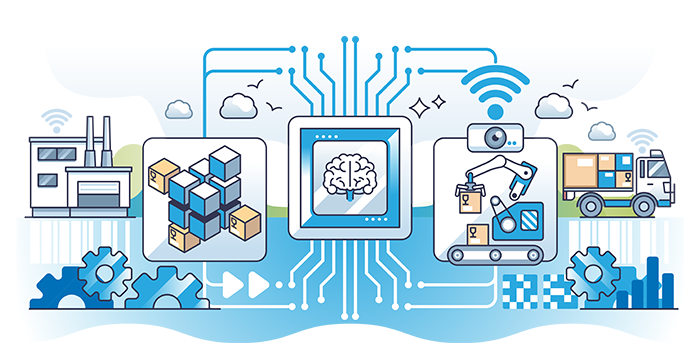
Transforming SCM: The Synergy of AI, IoT, and Big Data Analytics

In today's digital era, IoT, Big Data, and AI have become integral parts of our lives. From smart homes powered by IoT to businesses leveraging Big Data for strategic decision-making, and AI reshaping industries, these technologies are making a significant impact across various sectors.
View MoreThe 'G' in ESG: Steering the Supply Chain
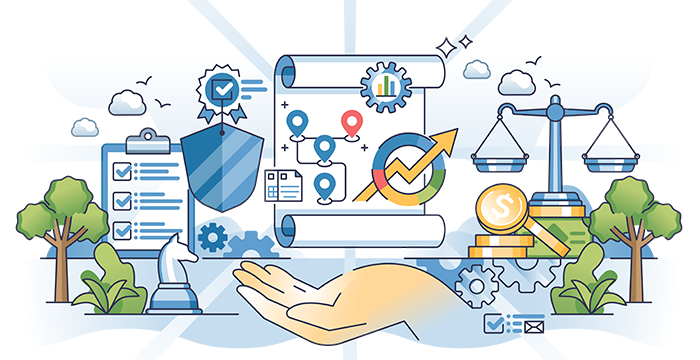
Environmental, Social, and Governance (ESG) factors have become a crucial part of business strategy in the 21st century. ESG stands for environmental, social, and governance and refers to a set of standards used to measure an organization's environmental and social impact.
View More

The 'S' in ESG: A Deep Dive into Social Sustainability

In the world of business and investing, Environmental, Social, and Governance (ESG) factors have become increasingly important. These factors provide a framework for assessing the impact of a company's operations on the world and its sustainability.
View MoreThe 'E' in ESG: A Deep Dive into Environmental Sustainability
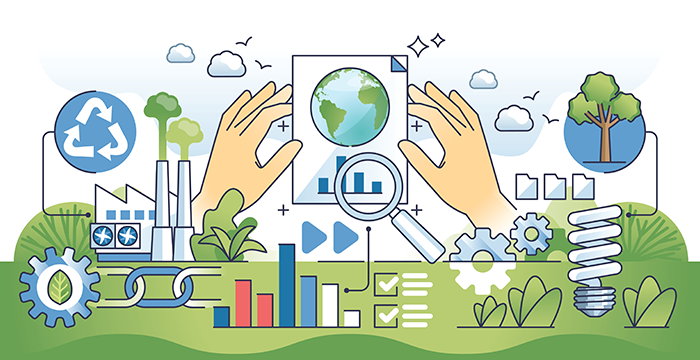
In today's business environment, ESG—Environmental, Social, and Governance—has become a crucial framework for evaluating a company's sustainability and societal impact.
View More
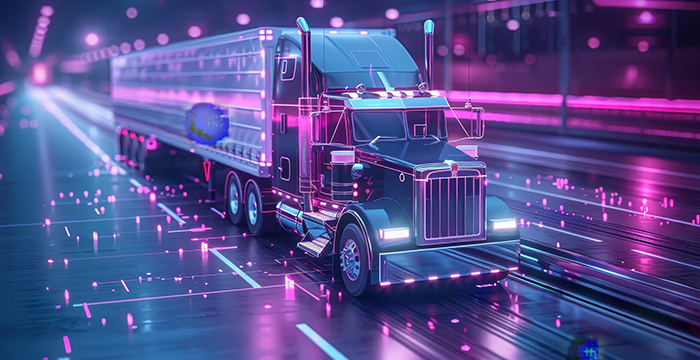
The Rise of Elastic Logistics: Transforming Logistics with Elastic Solutions

In the ever-evolving world of supply chain management, one concept has recently taken center stage: Elastic Logistics. This term, though relatively new, encapsulates a shift in thinking that has been gradually taking place in the logistics industry.
View MoreRevolutionizing Supply Chains: The Big Data & Analytics Advantage
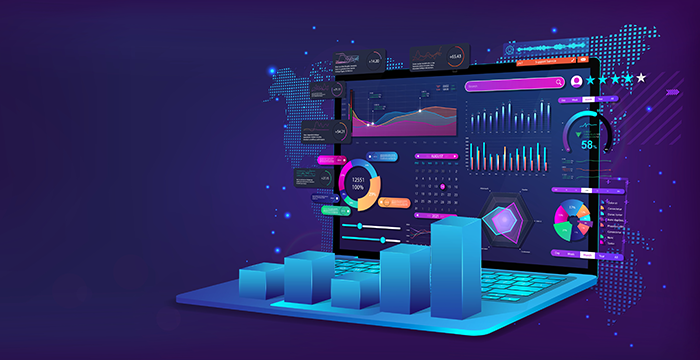
In the digital era, the terms Big Data and Analytics have become ubiquitous across various industries, with their impact on supply chains being particularly transformative.
View More

The Agile Edge: Revolutionizing Supply Chain Management

Agile methodologies have transcended their software development origins, becoming a transformative force in Supply Chain Management (SCM). This blog delves into the importance of applying agile methodologies in supply chain management, enriched with the latest statistics and practical examples that underscores the pivotal role of agility in SCM.
View MoreDriving Change: Ethical and Social Practices in Supply Chains

Supply Chain Management (SCM) is a complex network involving organizations, resources, information, and people to meet supply and demand. In 2020, the global SCM market was valued at roughly 16 billion U.S. dollars, and over the last decade, SCM software and procurement markets have more than doubled in size. This blog explores the ethical and social practices in SCM, emphasizing their importance and impact on global business operations.
View More
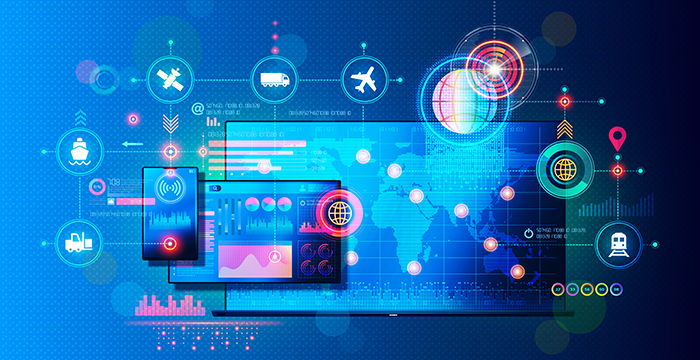
Revolutionizing Supply Chains: The DDMRP Advantage

In the wake of the COVID-19 pandemic and shifting geopolitical landscapes, businesses are increasingly turning to nearshoring as a strategic approach to optimize their supply chain operations. This blog explores the burgeoning phenomenon of nearshoring, unveiling its implications, benefits, and the pivotal role it plays in reshaping the global supply chain landscape.
View MoreNavigating Supply Chain Success
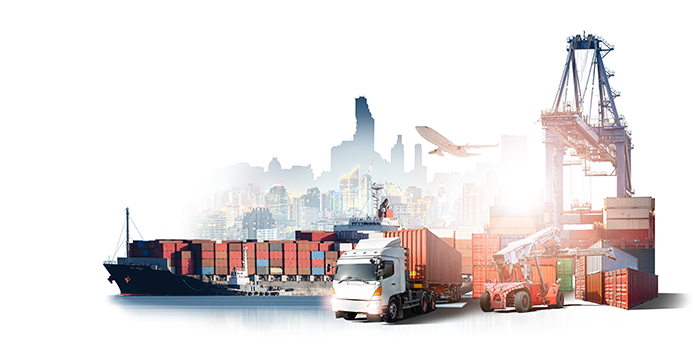
In the rapidly evolving world of supply chain management, benchmarking has emerged as a critical tool for identifying best practices and improving overall operations. In this blog, we will delve into the purpose of supply chain benchmarking, its need, and the importance of following best practices. We will also incorporate the latest statistics from 2023-2024 to provide a comprehensive and authentic overview.
View More

Navigating the Shift: Unveiling the Emergence of Nearshoring in Supply Chain Management

In the wake of the COVID-19 pandemic and shifting geopolitical landscapes, businesses are increasingly turning to nearshoring as a strategic approach to optimize their supply chain operations. This blog explores the burgeoning phenomenon of nearshoring, unveiling its implications, benefits, and the pivotal role it plays in reshaping the global supply chain landscape.
View MoreKPI Reporting Using GenAI in Logistics by 2028

Labor Management Systems (LMS) have become an integral part of the supply chain industry. They can be used to monitor productivity, identify bottlenecks, and optimize the workforce both inside and outside the distribution center. LMS have undergone significant transformations in recent years, driven by advancements in technology and changing workforce dynamics. This blog post will delve into the purpose of LMS, explore the latest trends.
View More
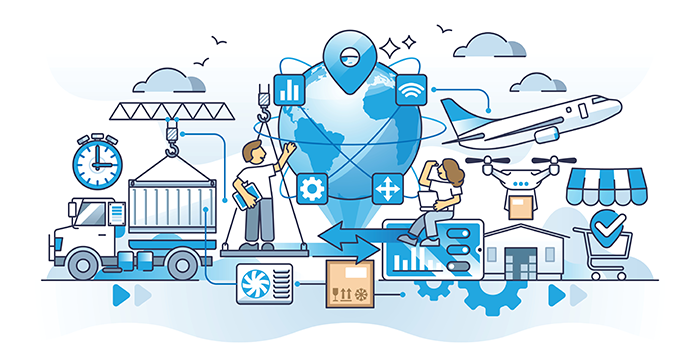
Visibility, Traceability, and Location Intelligence in Supply Chain Management

In the modern era of constant disruption, rapid digitization, and growing consumer demands, the traditional ways of managing supply chains are no longer sufficient. One of the key forces shaping the future of supply chains is the concept of visibility, traceability, and location intelligence. This blog post will delve into these concepts and their importance in the modern supply chain.
View MoreLabor Management Systems(LMS): Trends and Transformations

Labor Management Systems (LMS) have become an integral part of the supply chain industry. They can be used to monitor productivity, identify bottlenecks, and optimize the workforce both inside and outside the distribution center. LMS have undergone significant transformations in recent years, driven by advancements in technology and changing workforce dynamics. This blog post will delve into the purpose of LMS, explore the latest trends.
View More

Supply Chain Symphony: Balancing Automation and Human Expertise

In this harmonious composition, we explore the intricate interplay between automation and the human touch within supply chain operations. From labor challenges to technological advancements, join us on a melodic journey toward sustainable success. Remember, it's not just about the notes; it's about orchestrating a symphony that resonates across your entire supply chain. In today's dynamic business landscape, supply chain operations face unprecedented challenges and opportunities. As organizations strive for resilience, efficiency, and competitive advantage, several key factors come into play. Let's delve into the forces driving change, explore the automation landscape, and uncover strategies for sustainable success.
View MoreResilience and Risk Management in Supply Chain: Navigating Uncertainty
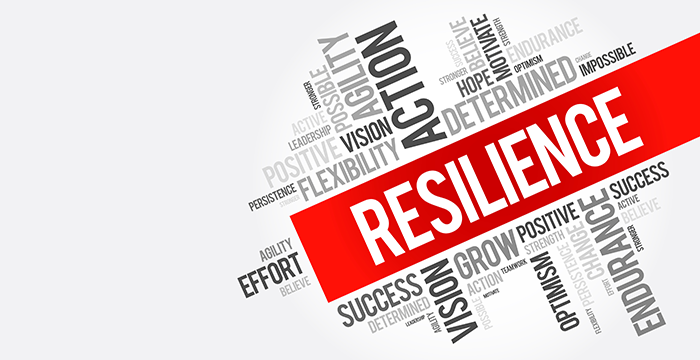
In the dynamic landscape of supply chain management, resilience and risk management have emerged as critical imperatives. As we transition from 2023 to 2024, let's delve into the key insights and strategies that will shape supply chain resilience in the face of disruptions. According to a report by Capgemini Research Institute, almost 8 out of 10 companies (79%) are diversifying their supplier base, with 71% actively investing in regionalisation and localisation.
View More
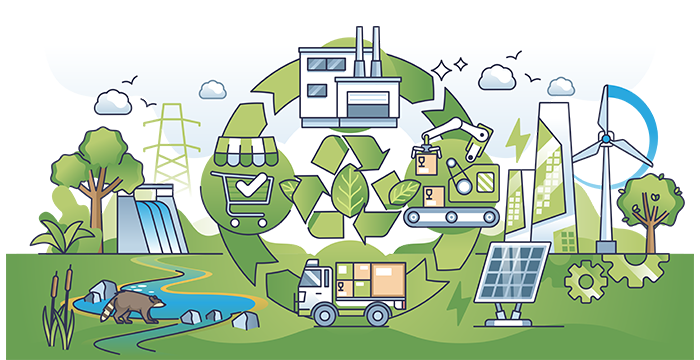
Sustainability and Circular Economy in Supply Chain Management

In today's interconnected global economy, supply chain management plays a pivotal role in ensuring the efficient flow of goods, services, and information. However, as organizations strive for growth and profitability, they must also address environmental and social challenges. Sustainability and the circular economy are two critical concepts that are reshaping supply chain practices. Let's explore how these principles intersect with supply chain management and why they matter.
View MoreAchieving ESG Compliance in Supply Chains: A Deep Dive into Key Indicators and Solutions

In the evolving business landscape, Environmental, Social, and Governance (ESG) compliance has become a critical factor in the success of organizations. This is particularly true for supply chains, where the impact of ESG factors can be significant and far-reaching. This blog post aims to provide a comprehensive guide on navigating ESG compliance in supply chains, focusing on key indicators and solutions.
View More

Climate Change and Supply Chains: Resilience in a Turbulent World

In an era of unprecedented global challenges, supply chains find themselves at the crossroads of climate change. While the Covid pandemic has dominated headlines, the less-publicized menace of climate disruption poses a far more serious threat. Let's delve deeper into the impact of climate change on supply chains, armed with the most recent facts and data.
View MoreGeopolitical Uncertainty and Its Impact on Global Supply Chains
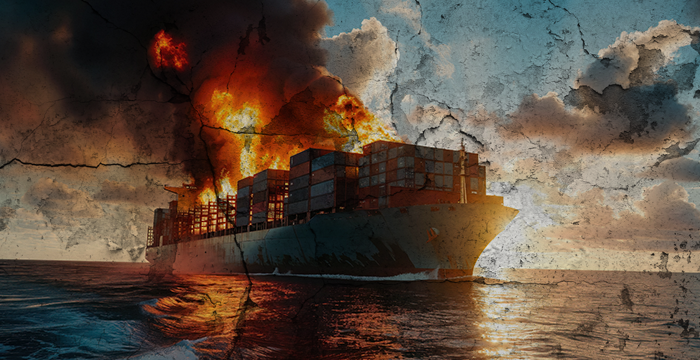
In an increasingly interconnected world, geopolitical events have far-reaching consequences. The delicate balance of global supply chains can be disrupted by conflicts, tensions, and economic crises. Let's explore how four specific geopolitical issues are affecting supply chains today and discuss strategies to mitigate their impact.
View More

Navigating the Supply Chain Terrain in 2024: Key Challenges for Retailers

As we chart our course into 2024, it's evident that the global retail supply chain is navigating through challenging times. From the lingering effects of the pandemic to the unpredictable forces of nature, our supply chains are being put to the test. Let's explore the top three hurdles that lie ahead for leaders in the industry this year.
View MoreNavigating Supply Chain Disruption: Building Resilience in SCM
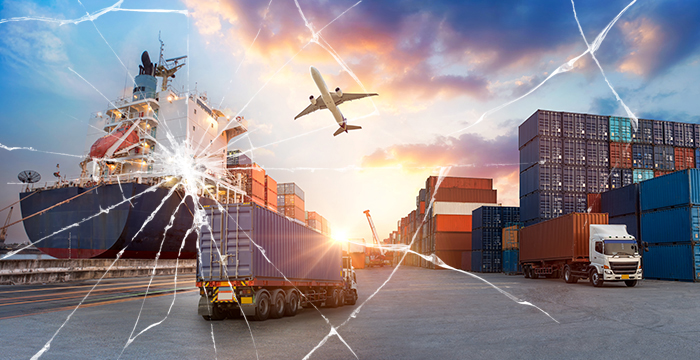
Disruption has become a defining feature of modern supply chains, reshaping the landscape of Supply Chain Management (SCM) worldwide. From pandemics to geopolitical tensions, crises have exposed vulnerabilities within SCM systems, necessitating a proactive approach to resilience-building. According to recent statistics, over 60% of supply chain leaders have identified the SCM process as a key contributor to rising costs and heightened risks.
View More
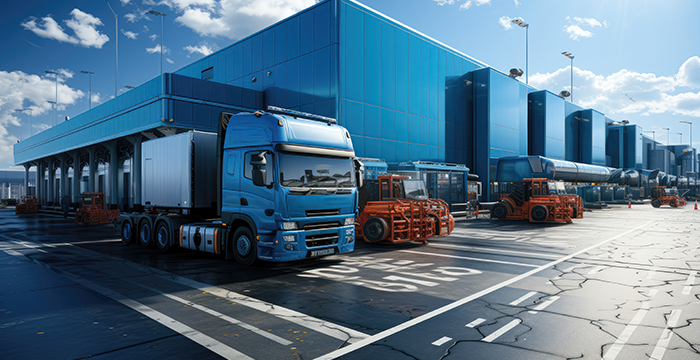
Unlocking Operational Excellence: The Evolving Landscape of Distribution Center Performance

In today's dynamic business environment, distribution centers (DCs) are at the forefront of innovation, leveraging cutting-edge technologies to drive operational excellence and efficiency. While warehouse robotics have garnered significant attention for their role in automation, the landscape of DC performance is shaped by a diverse array of technological advancements.
View MoreSupply Chain Trends 2024

The global supply chain landscape stands on the brink of a transformative era, driven by the relentless integration of digital technologies. While one might assume that the lessons learned from the pandemic have fortified businesses against supply chain disruptions, recent insights suggest otherwise. According to Gartner, a mere fraction of companies - less than 10% - are equipped to extract value from the uncertainties inherent in the supply chain domain.
View More

Digital Transformation Megatrends Revolutionizing Supply Chains in 2024

The imminent revolution in the global supply chain industry is spurred by various factors such as advancements in AI and global supply chain challenges. This transformation is underpinned by five significant megatrends that
View MoreNavigating Tomorrow's Warehousing Landscape: Anticipated Trends for 2024 and Beyond
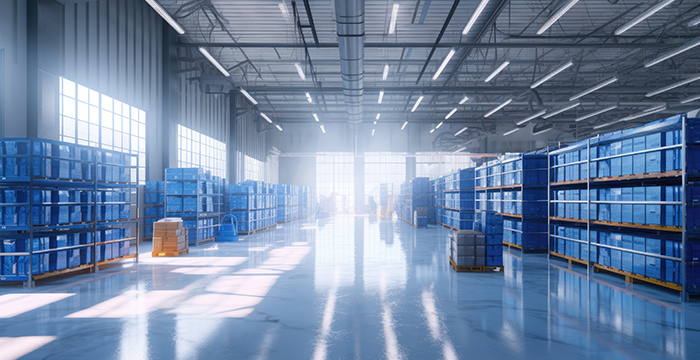
In recent years, global supply chains have faced unprecedented challenges, prompting a reevaluation of warehousing practices. As we look forward to 2024, the landscape
View More
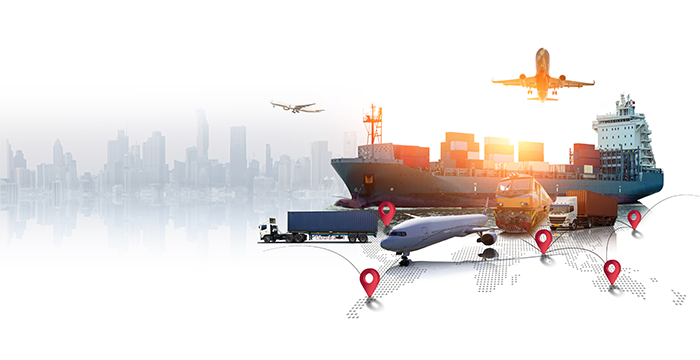
Navigating the Shifting Tides of Global Shipping and Logistics Beyond 2024

The dynamic landscape of global shipping and logistics is ever-evolving, with recent years marking a period of transformation propelled by the Covid pandemic, economic recovery, and supply chain disruptions. Drawing on over two
View MorePioneering the Next Phase of Supply Chain Excellence in 2024

Setting the Course for Future-Proof Operations in Your Supply Chain
Predicting the future, especially when it comes to the complex realm of global supply chain trends, is indeed a formidable task. In recent years, the dynamics of supply chains have undergone a significant shift, becoming
View More
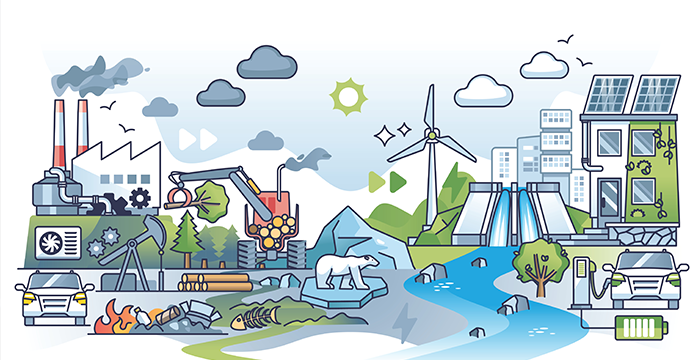
Unveiling Supply Chain Horizons 2024: AI and Sustainability at the Helm

Foretelling the future is a formidable task, particularly in the ever-changing realm of global supply chain trends. Over the past decade, supply chains have morphed into pivotal assets for numerous industries, and what defines a well-managed supply chain has shifted with time. As we peer into the trends of 2024, the spotlight is on fortifying against risks, embracing sustainability,
View MoreRETINA
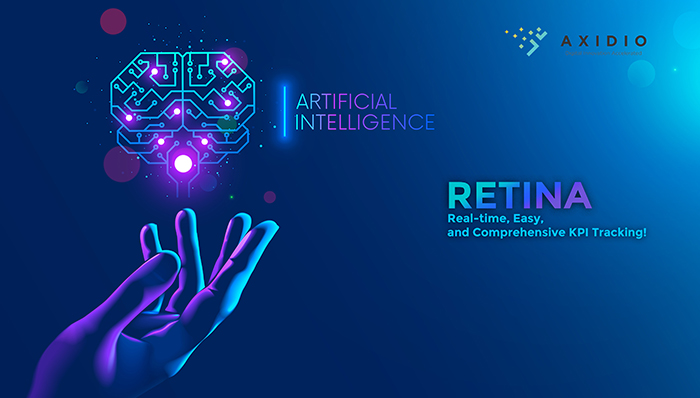
Revolutionize Your Supply Chain with Retina: Real-Time Insights, AI Magic, and More!
Struggling to track your supply chain's key performance indicators (KPIs) effectively? Retina streamlines KPI visibility, offering real-time tracking, historical data, customizable dashboards, alerts, automated reporting, and real-time chat for seamless collaboration.
View More
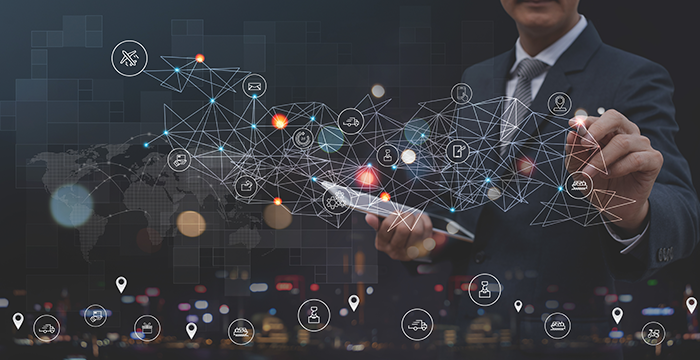
Supply Chain Network Design

Supply chain network design is the process of modeling a supply chain to better understand the costs and time associated with bringing goods and services to market. By optimizing the supply chain network, organizations can ensure that they are using the best procurement and manufacturing methods, modes of transportation, the best routes, and the right blend of intermediate assets to meet business goals.
View MoreSupply Chain Resilience
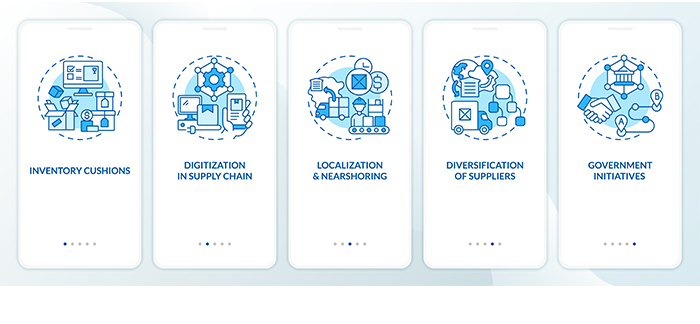
In today's fast-paced and complex business environment, supply chain disruptions are becoming increasingly common. From natural disasters to geopolitical tensions, a variety of factors impact supply chain performance. To minimize the risk of disruption and delay, businesses are taking action to increase supply chain resilience.
View More
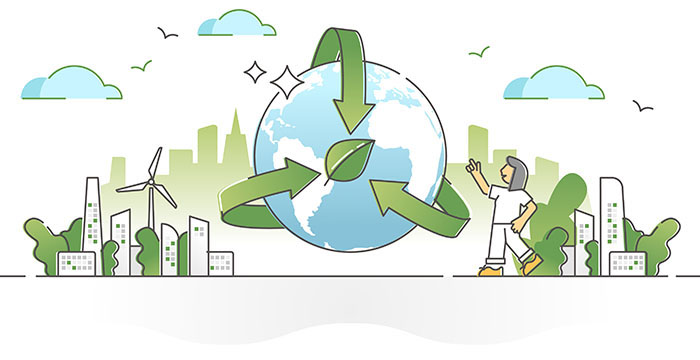
Sustainable Business Solutions

Today's consumers are attracted to brands that align with their personal values. Nearly 50% of U.S. consumers now say that they are willing to change their purchasing habits to reduce impact on the environment. The shift to being "eco-friendly" isn't just a trend; the relationship between consumer values and brand purpose will continue to strengthen in the future
View MoreEnabling Supply Chain Agility
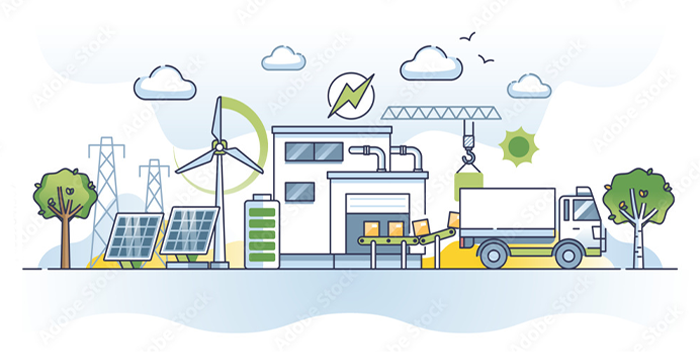
Digital evolution has fundamentally changed our world. Consumer demand and market dynamics now change rapidly, as customers have grown to expect speed, personalization and connectivity. This evolution has put supply chain management in the limelight, as an efficient and agile supply chain is a major competitive advantage in today's market. Throughout 2023 we expect the following items to be of top priority for supply chain executives:
View More

Blockchain And Supply Chain Management

Few emerging technologies have created as much hype as blockchain, which has the potential to revolutionize the world of digital transactions. According to Deloitte’s 2019 Global Blockchain Survey, “53 percent of respondents say that blockchain technology has become a critical priority for their organizations in 2019 – a 10-point increase over last year”. As the use of blockchain continues to expand, it is important for businesses to understand the cost and barriers of implementation versus the value that the technology can provide.
View MoreTurning Your Supply Chain Into A Competitive Advantage

Managing a complex supply chain network is a challenging endeavor that requires extensive communication and collaboration with internal and external stakeholders. The construction and maintenance of an efficient supply chain network requires considerable effort, time, money, expertise, industry connections, the development and implementation of technology – these are all inputs that are required to position your supply chain for advancement.
View More
